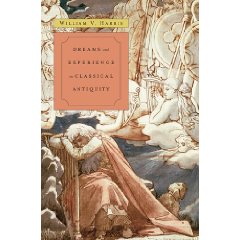
W. V. Harris, Dreams and Experience in Classical Antiquity, Cambridge (MA): Harvard University Press. 2009. 352 pages.
- ISBN: 978-0-674-03297-2
- prix: $49.95
Extraits en ligne sur www.hup.harvard.edu.
Présentation de l'éditeur:
From the Iliad to Aristophanes, from the gospel of Matthew toAugustine, Greek and Latin texts are constellated with descriptiveimages of dreams. Some are formulaic, others intensely vivid. The bestancient minds—Plato, Aristotle, the physician Galen, andothers—struggled to understand the meaning of dreams.
With Dreams and Experience in Classical Antiquity therenowned ancient historian William Harris turns his attention tooneiric matters. This cultural history of dreams in antiquity draws onboth contemporary post-Freudian science and careful critiques of theancient texts. Harris traces the history of characteristic forms ofdream-description and relates them both to the ancient experience ofdreaming and to literary and religious imperatives. He analyzes thenuances of Greek and Roman belief in the truth-telling potential ofdreams, and in a final chapter offers an assessment of ancient attemptsto understand dreams naturalistically.
How did dreaming culture evolve from Homer's time to lateantiquity? What did these dreams signify? And how do we read andunderstand ancient dreams through modern eyes? Harris takes an elusivesubject and writes about it with rigor and precision, reminding us ofspecificities, contexts, and changing attitudes through history.
Table des matières:
- Preface
- Abbreviations
- Introduction: Then and Now
From Epiphany to Episode: A Revolution in the Description of Dreams
- Epiphany or Messenger Dreams
- Definition and Origin of the Epiphany Dream
- Varieties of the Epiphany Dream
- Distinguishing the Epiphany Dream from the Modern Dream
- Other Kinds of Greek and Roman Dream Reports
- The Force of Convention
- Actual Epiphany Dreams?
- The Epiphany Dream in DangerGalen and Aelius Aristides
- Late-antique Stimuli
- Epiphany Dreams in the Middle Ages
- The Early-Modern Demise
- Explaining the Change
Greek and Roman Dreams That Were Really Dreamt
- Is this Tale Tall?
- An Essential Question
- The Matter of Authenticity
- The Problem of Memory
- Dream-like Dreams
- Mendacious Historians and Biographers
- Some Strong Candidates
- Perpetua
- Artemidorus
- Constantine
- Augustine
- Aelius Aristides
- Writing Good Stories
Greek and Roman Opinions about the Truthfulness of Dreams
- What They Believed and What We Believe
- Truth
- Belief
- The Interpreters
- Metaphors
- The Greeks before the Sophists
- Fifth-century Athens
- Ordinary and Extraordinary Athenians in the Fourth Century
- Plato and Aristotle
- Hellenistic Impressions
- Predictive Dreams in the Context of Greek Divination
- The Roman Republic down to Sulla
- Lucretius, Cicero and the Late Republic
- Incubation and the Doctors
- Augustus to the Flavians
- A Victory for Religion?100–250 AD
- What Dreams Were Good for under the Roman Empire
- Late Antiquity
- A Conclusion
Naturalistic Explanations
- Introduction
- The Origins of Naturalistic Thinking about Dreams
- The Preplatonic Philosophers
- 'Hippocratic' Doctors
- Back to Plato
- Aristotle Uncertain
- The Epicureans
- Other Hellenistic Voices
- The Reasons for a Failure
- A Note on Galen
- What Does a Swallow Mean?
- A Complete Halt
- Conclusions
- Bibliography
- Index
- Illustrations